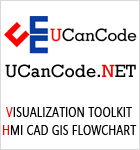|
Data
Visualization
Software, VC++ Source Code Component Solution
The quick and simple way to building
Data Visualization Software with
VC++, and the
.NET platform
 Download
this Data Visualization Sample
1
UCanCode provides a complete set of
services, consisting of design tools and
a software
development kit (SDK), for developers who want to create a user
interface for industrial monitoring and process control drawing
Data Visualization applications. These displays feature
highly customized graphical objects that connect to underlying real-world
data.
Developers prefer UCanCode's solutions
because they are easy to use, completely customizable, and can deploy to
both the desktop and the Web. UCanCode is the industry’s leading
real-time SPC software, automating quality data collection and
analysis
Add Diagrams and
Data Visualization to your applications. E-XD++ Diagrammer brings accurate and
intuitive diagrams and dashboards to your c++ desktop applications. It
offers a comprehensive set of tools, components and graphic objects for
creating visualization, editing and monitoring Windows applications.
It is very quickly and
easily to use E-XD++ to build any
Data Visualization Software:
1.
Design the
Data
Visualization
symbols:
With E-XD++ full edition, there is a shapedesigner
application shipped, with this diagramming tool, you can
use many advance features to build any kind of
Data Visualization Software
symbols, as below:
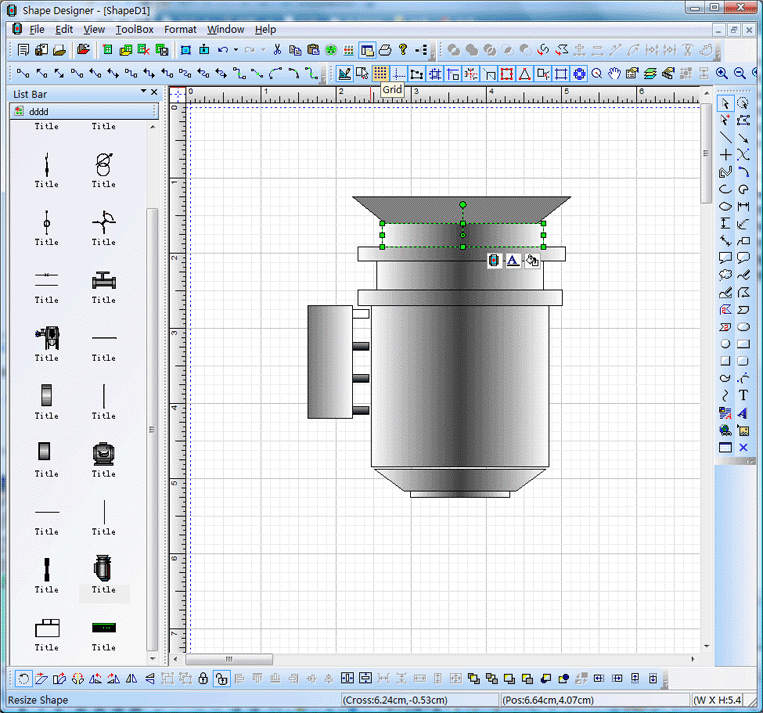
When one composite symbol
is designed, just use Copy/Paste to place it within the
toolbox window at left side. These
Data Visualization Symbols will be ready for use in
future.
2. Design
Data Visualization Software Screen:
With E-XD++ full edition,
there is also a ready to use
Data Visualization Screen design tool shipped, with this
tool, you can use any symbols within the toolbox window
at left side to build any screen as you want, just drag
and drop, very simple and easy:
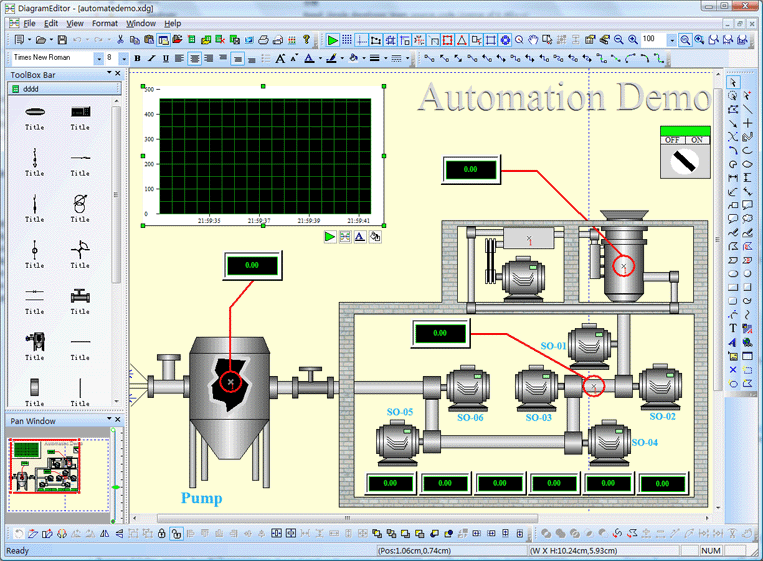
If you want to identify any
shape on the screen, just use the following dialog to
define some key value. There are three key values that
can be used to do this work, as below:
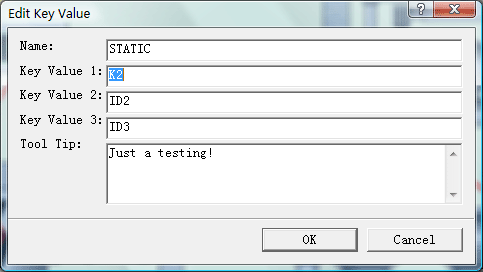
We change it's key value 1
to K2.
After one
Data Visualization Software
Screen is finished, you can save it to a xdg file. You
can design as many screen as you want.
3. Building your
Data Visualization Software:
With full edition of E-XD++
Visualization Component, there is an appwizard that will
help you building a base framework of
Data Visualization Software without
written a line of codes, after the base framework of
your application is finished, you can import any XDG
files into your application, (Please remember the
resource type must be XDGRes), to load a
Data Visualization Screen just
call the following codes, it is very easy:
LoadXdgFromResource(IDR_MAIN,
_T("XdgRes"), FALSE);
In fact, this line of code
can be called at any place if you want to load any new
screen at any time.
4.
Update the screen with data:
Mostly we can use the WM_TIMER of CWnd to recieve the
data and refresh the Data
Visualization
Screen, if you want to update only one shape, just call
UpdateControl of this shape, but if you want to update a
list of shapes one time, we recommend you to call
UpdateShapes, this will works more effective, below is
the sample codes:
void CAutoDemoView::OnTimer(UINT nIDEvent)
{
// TODO: Add your message handler code here and/or call default
if(nIDEvent == ID_TIMER_ID)
{
CFODrawShapeList lstUpdate;
int xx0 = rand() % 20;
int xx1 = rand() % 18;
int xx2 = rand() % 25;
int xx3 = rand() % 16;
int xx4 = rand() % 12;
int xx5 = rand() % 21;
if(pK1 != NULL)
{
CString strText;
strText.Format(_T("%u mcA"), xx0 * xx1);
pK1->SetLabelText(strText);
lstUpdate.AddTail(pK1);
}
if(pK2 != NULL)
{
CString strText;
strText.Format(_T("%u C"), xx0 * xx2);
pK2->SetLabelText(strText);
lstUpdate.AddTail(pK2);
}
if(pK3 != NULL)
{
CString strText;
strText.Format(_T("%u Nm/h"), xx0 * xx3);
pK3->SetLabelText(strText);
lstUpdate.AddTail(pK3);
}
if(pX1 != NULL)
{
CString strText;
strText.Format(_T("%u"), xx0 * xx4);
pX1->SetLabelText(strText);
lstUpdate.AddTail(pX1);
int nValue = xx0 * xx4;
if(nValue > 200)
{
pX1->SetBkColor(RGB(255,0,0));
}
else if(nValue > 100)
{
pX1->SetBkColor(RGB(255,255,0));
}
else
{
pX1->SetBkColor(RGB(0,0,0));
}
}
if(pX2 != NULL)
{
CString strText;
strText.Format(_T("%u"), xx0 * xx5);
pX2->SetLabelText(strText);
lstUpdate.AddTail(pX2);
int nValue = xx0 * xx5;
if(nValue > 200)
{
pX2->SetBkColor(RGB(255,0,0));
}
else if(nValue > 100)
{
pX2->SetBkColor(RGB(255,255,0));
}
else
{
pX2->SetBkColor(RGB(0,0,0));
}
}
if(pX3 != NULL)
{
CString strText;
strText.Format(_T("-%u"), xx1 * xx5);
pX3->SetLabelText(strText);
lstUpdate.AddTail(pX3);
int nValue = xx1 * xx5;
if(nValue > 200)
{
pX3->SetBkColor(RGB(255,0,0));
}
else if(nValue > 100)
{
pX3->SetBkColor(RGB(255,255,0));
}
else
{
pX3->SetBkColor(RGB(0,0,0));
}
}
if(pX4 != NULL)
{
CString strText;
strText.Format(_T("%u"), xx2 * xx3);
pX4->SetLabelText(strText);
lstUpdate.AddTail(pX4);
int nValue = xx2 * xx3;
if(nValue > 200)
{
pX4->SetBkColor(RGB(255,0,0));
}
else if(nValue > 100)
{
pX4->SetBkColor(RGB(255,255,0));
}
else
{
pX4->SetBkColor(RGB(0,0,0));
}
}
if(pX5 != NULL)
{
CString strText;
strText.Format(_T("%u"), xx2 * xx4);
pX5->SetLabelText(strText);
lstUpdate.AddTail(pX5);
int nValue = xx2 * xx4;
if(nValue > 200)
{
pX5->SetBkColor(RGB(255,0,0));
}
else if(nValue > 100)
{
pX5->SetBkColor(RGB(255,255,0));
}
else
{
pX5->SetBkColor(RGB(0,0,0));
}
}
if(pX6 != NULL)
{
CString strText;
strText.Format(_T("%u"), xx3 * xx5);
pX6->SetLabelText(strText);
lstUpdate.AddTail(pX6);
int nValue = xx3 * xx5;
if(nValue > 200)
{
pX6->SetBkColor(RGB(255,0,0));
}
else if(nValue > 100)
{
pX6->SetBkColor(RGB(255,255,0));
}
else
{
pX5->SetBkColor(RGB(0,0,0));
}
}
if(pChartShape != NULL)
{
pChartShape->UpdateData(xx0 * xx1, xx0 * xx2, xx0 * xx3);
lstUpdate.AddTail(pChartShape);
}
if(lstUpdate.GetCount() > 0)
{
UpdateShapes(&lstUpdate);
}
}
else
{
CFODrawView::OnTimer(nIDEvent);
}
}
If you want to handle the
click event, you can DoButtonClickEvent to do that.
That's all, below is the
running - time mode of this sample.
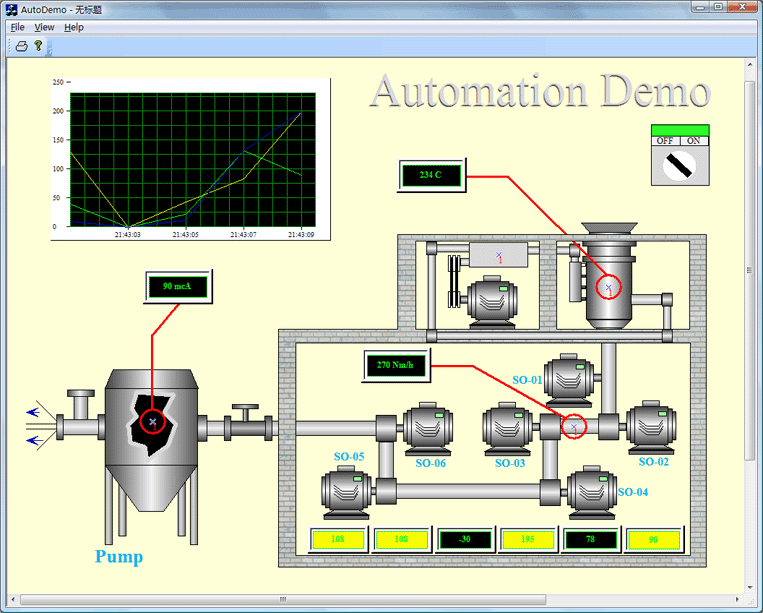
- Data
Visualization
Software Component
Process
Control Diagram
Full
VC++ Source Code
Real - time
Drawing
Very easy to use shape Designer
SVG Import
With E-XD++
Component,
you can add advanced Data Visualization functionality to your
applications. The E-XD++ Library is a 100%
VC++ data
rendering and visualization system, built
specifically for Visual Studio .NET and designed to
bring your User Interface to the printed page. Now you
only need a few days for building a very powerful label
print or report print application.
The leader in visualization component -- FULL
VC++ Source Code Shipped!
XD++ Diagrammer Suite is the the world’s
leading VC++ and .NET visualization component. Renowned for incredibly rich
graphics, XD++ helps thousands developers build applications that offer
unparalleled functionality. Outstanding productivity lowers project risk and
reduces maintenance headaches. With 20 years of dedicated research and
development, UCanCode leads the market for visualization technologies,
providing outstanding customer support.
Powerful, flexible, and
easy to use Diagram Components.
Powerful and flexible enough to create diagrams exactly the way you want
them to appear. So easy to use that you will be able to prototype your
application in just a few minutes.
Feature rich.
With features such as automatic layout, multiple layers, collapsible
sub-graphs, snap-to connection points, XML, SVG, and more, E-XD++ Have the
power and flexibility you need to create sophisticated diagrams, quickly and
easily. Events such as click, double-click, hover, select, rubber-band
select, copy, delete, resize and move are supported. Operations such as
drag-and-drop, unlimited undo/redo, and clipboard operations are common and
complex, and are expected by today's sophisticated users. it full supports
importing ArcGis, SVG and DXF File format.
Performance and
Scalability.
UCanCode E-XD++ Capable of handling many thousands of nodes and edges, up to
hundreds of thousands depending upon the complexity of the nodes you wish to
draw and the operations you wish to allow. Our graphical classes are
extremely lightweight objects enabling outstanding performance.
Save Time and Money and gain Reliability.
A diagram is worth 1,000 words, and E-XD++ is shipped with more than 500,000 lines of well designed and well tested code! It is used by hundreds of the world's most quality conscious companies. It will saves you thousands of hours of complex coding and years of maintenance.
 Download
this Data Visualization Sample
1
The
VC++ source codes of this tool is shipped with E-XD++
Library Enterprise Edition,
order it now.

News:
1 UCanCode Advance E-XD++
CAD Drawing and Printing Solution
Source Code Solution for C/C++, .NET V2025 is released!
2
UCanCode Advance E-XD++
HMI & SCADA Source Code Solution for C/C++, .NET V2025 is released!
3
UCanCode
Advance E-XD++ GIS SVG Drawing and Printing Solution
Source Code Solution for C/C++, .NET V2025 is released!
Contact UCanCode Software
To buy the source code or learn more about with:
 Next-->
Next-->
True
Microsoft word like table Component Control Solution
from UCanCode
-- Full VC++ Source Codes
|
|


